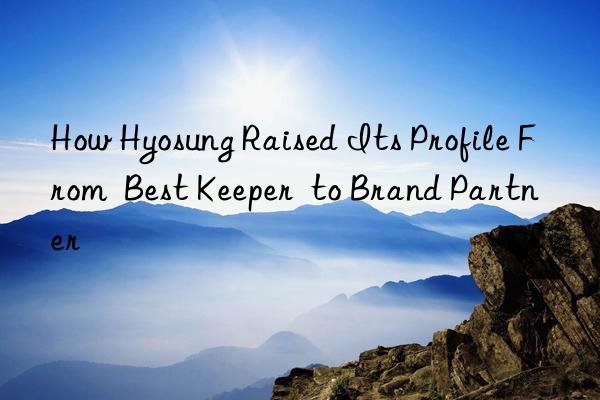
Traditionally in the fashion industry, factories have been the middlemen between fiber companies and brands. However, escalating sustainability demands are creating more direct relationships between material suppliers and retailers.
Consumers are asking more nuanced questions about the environmental status of fabrics, and due diligence regulations require knowing the facts behind the fibers. Amid this changing situation, synthetic materials manufacturer Hyosung has stepped up support for supply chain partners, positioning itself as a total textile solutions provider in the industry.
Simon, Director of Global Textile Marketing, Hyosung Whitmarsh-Knight said: "As brands and retailers look for more verification and certification requirements, they are moving further up the value chain and connecting with fiber suppliers. Despite its size, Hyosung remains an industry leader The best-kept secret, but that is changing as brands pay attention. You may not have heard of Hyosung, but you probably already use our fibers in many of your fabrics.”
Sustainable Solutions
The textile division of the South Korea-based company is a one-stop supplier of three main synthetic materials, namely spandex, nylon and polyester. Hyosung is continuously increasing its sustainable assortment of these yarn types to address customers' different priorities and fit with various product stories. Simon Whitmarsh-Knight said: "Textiles have historically been viewed as bad for the environment. As an industry, we've been talking about doing less of the bad, but at Hyosung we want to talk about doing more of the good."
Hyosung's recycled line is composed of 100% recycled spandex, polyester and nylon fibers, creating new uses for waste, including discarded fishing nets and post-consumer waste such as ocean plastic and PET bottles. Since launching the regen platform, Hyosung has increased the use of recycled materials to 100%. This can have the greatest impact in smaller blend partners, especially for types that use only 1 to 2 percent spandex in apparel, such as jeans.
A newer product in Hyosung's lineup is creora® bio-based spandex, which will be commercialized for the first time in 2022. This spandex is made by replacing 30% of fossil raw materials with ingredients derived from corn. Not only is corn a renewable resource, but the crop also absorbs carbon from the atmosphere. creora® bio-based spandex has 20% lower carbon emissions than traditional spandex. Pangaia was an early adopter of creora® bio-based spandex, using the fiber in its Activewear 3.0 clothing series.
Two new products launching this spring are creora® regen black spandex and creora® biobased black spandex, which combine regen and biobased sustainability stories with an added color edge. During the production of these yarns, black pigment is added to the spandex solution before extrusion, using less water to dye the yarn. Spandex fibers are usually white and cannot absorb dye at the yarn stage, so in garments such as those with stretch, the elastic can be exposed or worn through the fabric. Using dyed fibers can create a more uniform look.
Simon Whitmarsh-Knight said: "We're always trying to get products ahead of what customers really need so we can get new products adopted and help brands grow faster. Sustainability strategies today are piecemeal, but hopefully Ultimately there is more consensus on the ideal approach, which can bring demand together to support better pricing. We can't do it on our own. To gain scale, we have to get everyone moving toward the same direction forward."
Supply Chain Partnership
As an example of its brand innovation, Hyosung has worked closely with backpack brand Osprey on fabric development. Osprey released the first regen using Hyosung Robic durable nylon backpack. Loc of the Osprey Materials Team "Hyosung has been a true strategic partner of Osprey and they always do their best to anticipate and meet our requirements," said Tran.
To support the speed-to-market of new yarns, Hyosung cooperates with major spinning mill partners around the world. For Denim Textile Manufacturer Tejidos For Royo, what sets Hyosung apart is consistency. Jose, Vice President of Tejidos Royo Royo said: "Trying fibers from hundreds of different suppliers, we ended up choosing materials from only two or three key suppliers. Hyosung is one of these companies, and it gave us a guarantee of quality very quickly. They know What are you doing?"
As Hyosung becomes more well-known in the B2B market as an ingredient brand, it is also working with its retail customers to communicate with end consumers. Its marketing support includes digital stories -- such as educational YouTube videos -- and custom hang tags with elements such as QR codes.
Simon Whitmarsh-Knight said: “Stories and chains of evidence are very important, and brands and retailers are taking this very seriously because in this space of sustainability, there are so many claims and not all of them are rigorous and comprehensive. And do it in a compliant way. At Hyosung, it’s really important to get it right, get it right, and help our customers do that.”



 微信扫一扫打赏
微信扫一扫打赏
